#webs centered essay
Explore tagged Tumblr posts
Text
in wendy by maisie peters we see her weave a web where she chooses herself over the boy she loves because she knows she can’t keep living off of magic and maybes or love him until he’s ready because she knows she deserves more and it isn’t fair for her to wait for something good on someone who is promising a maybe. however in peter by taylor swift we see the opposite happen. taylor says she kept living off of those maybes by holding onto the fact he said he’d “grow up and come find (you)”. she waited and everyone could see her hope dwindling as the wax melted more and more, because the candle kept burning, until finally she blew it out cause she realized it was a hollow promise.
in wendy we see maisie chose herself and center herself in the narrative, thus why the songs called wendy and focuses on har story. but in peter we see taylor give up but still center him in the story because she loved him and hoped it would work out and her time wasn’t wasted. so even in her closing the book she still focuses on him rather than her because she never thought about how she felt waiting and only thought about him.
in this essay i will-
129 notes
·
View notes
Text
Today is my husband’s Peter David’s 68th Birthday. I don’t know where I am giving to visit him but I will today either in the hospital or the rehab center.
A little bit about my husband, the longer form can be found on Wikipedia if you search Peter David.
Peter is a writer of stuff. He is known for his comic book work, novels, and essays.
Comics: some of his achievements, wrote the Hulk for fourteen years, he created the Aquaman that Jason Momoa played in the films, created Spider-man 2099, the smart Hulk was his invention, X-factor, wrote Young Justice both the comic book and the animated series.
Tie in novels: probably best known for his Star Trek novels esp. Imzadi, Q-in-law, and the New Frontier with a character named Burgoyne 172 who is neither and both male and female. He did a number of movie novelizations for all kinds of franchises including Babylon 5, Marvel, DC, among others.
Novels: Fearless, Tigerheart, Howling Mad, Artful, the King Arthur series, Sir Apropos of Nothing and a whole bunch more.
Essays: wrote But I Digress for the Comic Buyers Guide, Op Ed pieces for the New York Times, and for his web log
Peter writes, he once told me, because he has to. He has so many ideas and what ifs running around in his head. We are working to get dictation to work for him.
Almost two years our lives were upended when Peter has a series of strokes, a heart attack, more strokes and a nasty Mersa virus that played havoc with his body. He is surviving with some physical limitations but the mighty writers brain works. I have been his caretaker since the previous strokes for over ten years and during that time he has developed diabetes and end stage renal failure for which he is on dialysis.
We still love each other very much and have held to our marriage vows close to our hearts









Happy birthday my love.
#peter David#Star Trek#incredible hulk#young justice#x factor#but i digress#aquaman#super girl#spiderman 2099#migeul o'hara#happy birthday#my husband#I love him
36 notes
·
View notes
Text
Blond and black, good and evil
Ciri, Avallac’h, and Eredin: a tangled web of who liked whom and whose destiny belonged to whom.
Let’s unpack this drama step by step. What follows is a rough translation of my short essay in Russian, which wouldn’t have been possible without the tireless efforts of my dear friend Livingonmyown. Her mastery of Polish and saintly patience helped us dive into the Aen Elle chapters together, meticulously comparing the original text to the Russian translation. And let me tell you, the Russian version took more creative liberties than an amateur bard after a few pints.
In this version, I’ll focus on the English translation, which, surprisingly, seems to have done a little less butchering than its Russian counterpart. Progress!
Let’s kick things off from the beginning. Avallac’h genuinely believed he was Ciri’s destiny—just like Geralt once did. Except Ava seemed to think he was even destinier. (Yes, that’s totally a word now.) How else can we explain his borderline giddy reaction, practically leaping for joy, when he said this?
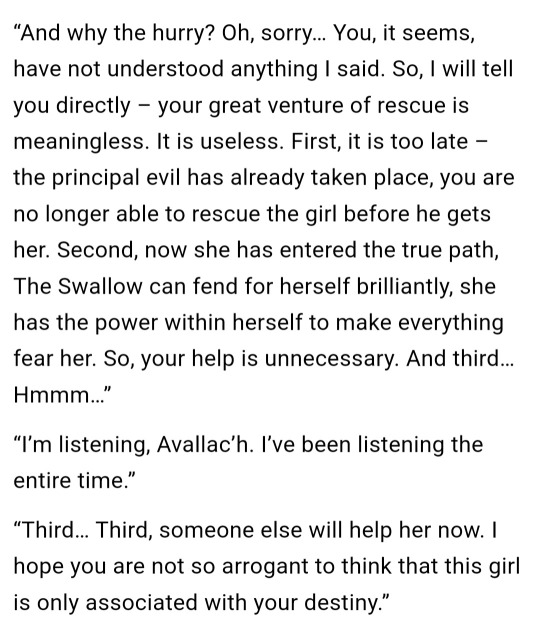
No one could ever convince me that our dear sage meant anyone other than his all-knowing, ever-scheming self.
Could he have meant Auberon? Not a chance. Ava worked far too hard to bring Ciri to the world of the Aen Elle for it to be about anyone else. He even moonlighted as a tour guide for dh’oine visitors, proudly leading them to the Tower of the Swallow. And why? So some Buyvid fellow could scribble together a manual for Ciri, just so she’d read about the Tower and march straight to it.
And what was supposed to happen next? Naturally, the legendary elven guide Avallac’h would materialize before her eyes like some glowing vision from destiny itself.
But alas, Ciri didn’t even remember Ava’s name from the manual. Ouch. Ava must have been crushed—so crushed, in fact, that he vanished for a full eight days after finally meeting her. A dramatic exit, if ever there was one.
Another important thing that we know about Ava is that he really saw the future.
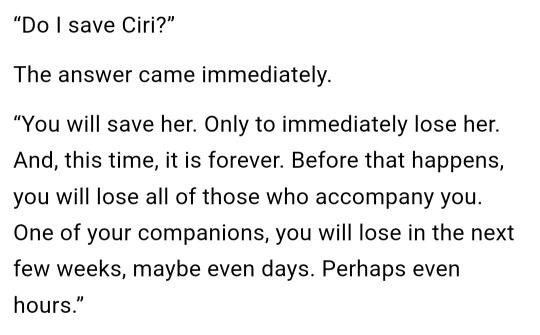
Avallac’h was right—Ciri escaped the Aen Elle and found her way back to Geralt. Not for long, mind you, but still, a win’s a win. Interestingly, it seems Ava knew from the very start that Ciri would bolt. Which, if you think about it, means he probably also knew his grand plan with Auberon was doomed from the get-go. But hey, I’m getting ahead of myself.
After Lara’s death, Ava had plenty of time to prepare for Ciri’s arrival. Decades, really. He could have planned every tiny detail down to the last ceremonial ribbon. The Aen Elle could have been running dress rehearsals weekly: parades, songs, inspirational speeches—you name it. Picture the scene: the entire Aen Elle court, decked out and joyous, gathering to welcome the Elder Blood’s triumphant return. And at the center of it all, Ava emerges—an elf from the legends, flute in hand, practically radiating destiny itself.
Except... reality had other plans. Ava did emerge, yes, but he forgot to introduce himself. And then, in peak Ava fashion, he vanished for eight entire days. Way to make an impression.

(Admiration, mind you ;)
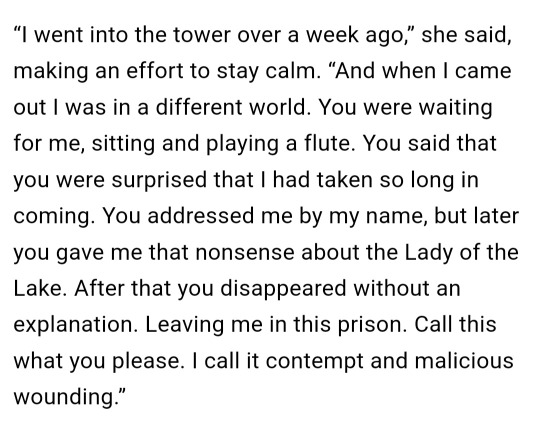
That was a bizarre move on Ava's part. If he’d been planning to dazzle Ciri with his legendary charm and make a great first impression, well... epic fail. Disappearing for eight days? Lame, Ava. Super lame.
So, what was he doing during all that time? Plotting? Pouting? Perfecting his flute skills? Who knows. But don’t worry, I’ll try to dig into that mystery a bit later. For now, let’s keep plowing through the text and unraveling this saga.
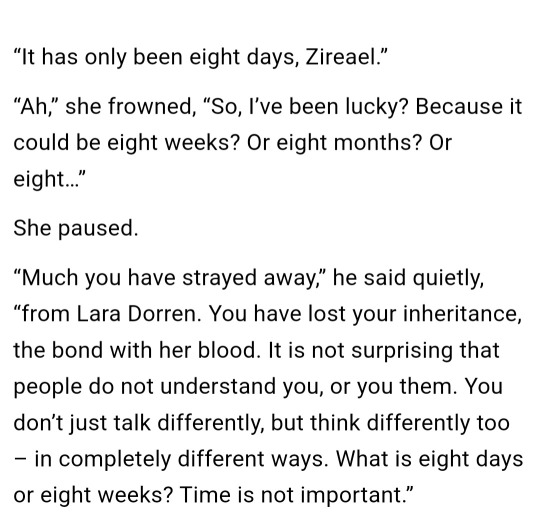
Ava isn’t in any rush. Why would he be? He’s the very picture of elven patience. But not everyone shares his laid-back attitude. Enter Eredin, who clearly can’t wait.
Now, let me remind you: after eight whole days in the Aen Elle world, Ciri still has no clue what these elves actually want from her.
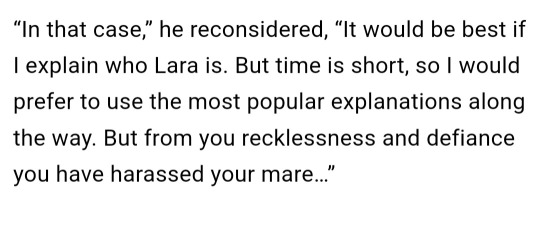
They meet Eredin on their way to Tir na lia.
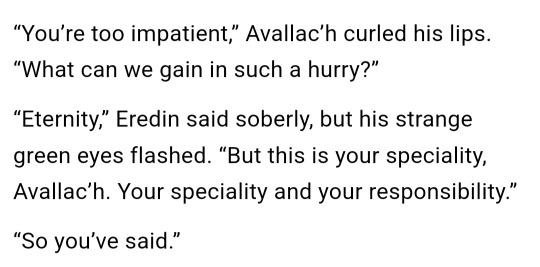
The second impatient elf is waiting back at the palace, but we’ll get to him in just a moment.
Now, onto my favorite part: the infamous flower scene—the very cornerstone of the Ciredin ship. Let’s dive back into it and take a closer look, shall we? Specifically, let’s focus on Ciri’s body language. Because, as we all know, our bodies have a way of betraying our emotions. Fear, excitement, arousal—whatever it is, the signs come fast. Blushing, sweating, turning pale—it’s all there, happening in a split second.
So, as we re-read this passage, pay close attention to the timing of her reactions. It’s all in the details. Now, here’s the scene:
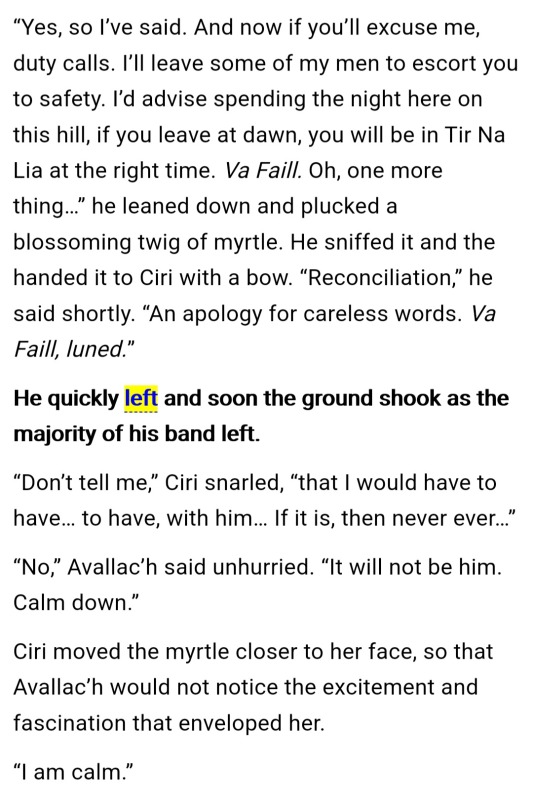
Now, close your eyes and imagine you’re Ciri. Suppose you fancy Eredin. He picks up a flower and hands it to you. Maybe your fingers brush—just for a moment—you feel the warmth of his hand, maybe even his breath. And if you do like him, this is the moment when you’d blush. It’s instinctive. You’d probably lift the flower to your face—not just to smell it but also to hide how flustered you are. Classic move, right?
Then Eredin leaves, and you turn to Avallac’h with the question: “Is it him? Is Eredin supposed to be the father of my child?” And Ava, in his ever-dramatic wisdom, says, “Nope.” If you were into Eredin, you’d probably feel disappointment. Frustration, even. Totally normal human reactions. At least, that’s how I imagine it.
But now, let’s revisit the actual text. When Eredin gives Ciri the flower, there’s no mention of her immediate reaction. None. Zilch. Nada. Instead, her feelings show up after Eredin leaves. Specifically, she feels a surge of excitement—not when she’s holding the flower, not when Eredin is standing right there, but when Ava tells her she’s not going to sleep with Eredin.
So, what’s sparking Ciri’s excitement and fascination? The answer lies a few passages earlier, when Eredin makes a certain comment about Ciri’s eyes.
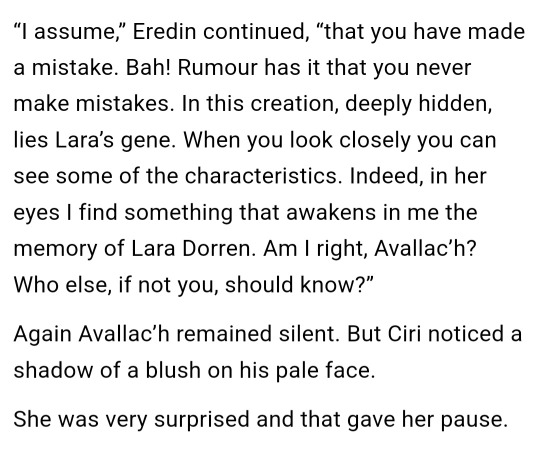
Ciri’s no fool. By now, she must have pieced together that Avallac’h was very close to Lara. Because honestly, who else besides a parent or a lover would need to gaze that deeply into someone’s eyes?
So, now Ciri knows that Ava wasn’t just some casual acquaintance of Lara’s—he was someone truly significant. And definitely not a brother—because let’s be real, why would he blush then?
When Ava tells her that Eredin isn’t their lucky candidate, what’s Ciri supposed to think? 😉 The dots are connecting themselves.
After Eredin leaves, Ciri finally works up the courage to ask the burning question: who’s meant to be the father of her child? All eyes on Ava now.

Notice how Avallac’h holds back, waiting to hear Ciri’s answer before revealing who’s supposed to be the father of her child. And why is that?
I’ll tell you why: it’s fear. Plain and simple.
Picture the situation: Ava’s about to drop the bomb that the father will be Auberon—their leader, the crème de la crème, the most elite of the elite, the noblest of the noble. This should be his shining moment, a perfect setup for an epic sales pitch. So why the hesitation? Why the silence? It’s almost as if... he can’t bring himself to say it.
The Fox knows exactly who Ciri is destined for—or at least, he thinks he does. Otherwise, why would he flaunt his tail so confidently in front of Geralt? But this all-knowing sage is suddenly terrified. Why? Because he’s been here before. Cast aside in favor of a human, mocked behind his back by the whole of Tir na Lia. Oh, they don’t do it openly—no one dares, or Ava might jinx them—but the laughter lingers in whispers.
And now, after all these years, history threatens to repeat itself. Another dh’oine enters the picture, and this time, she’s destined for him. What a scandal. If a child is born, Ava becomes the father of a half-blood. The mockery will only intensify: first Lara "took the wrong path," and now Avallac’h, an elite Aen Saevherne, follows in her footsteps.
The fragile ego of the Fox can’t handle such a trial. So, he does the only thing he can think of: pass the responsibility to someone "safe." Enter Auberon, an elf of advanced age and familial ties, who’s unlikely to get... overly interested. It’s a classic case of “grandpa’s old, he doesn’t care.”
As for those eight days of absence? Ava was stalling, wrestling with himself over who would ultimately carry the burden. In the end, it was Auberon who got the short straw. Ava had to choose someone to take the heat—and it wasn’t going to be him.
Now, let’s move to the palace scene and the second impatient elf who couldn’t wait to meet Cirilla.
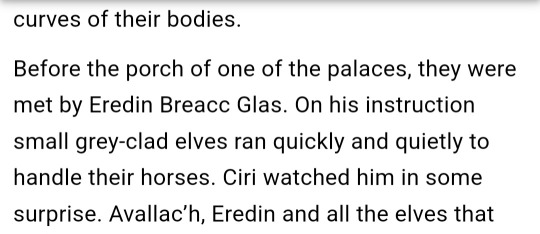
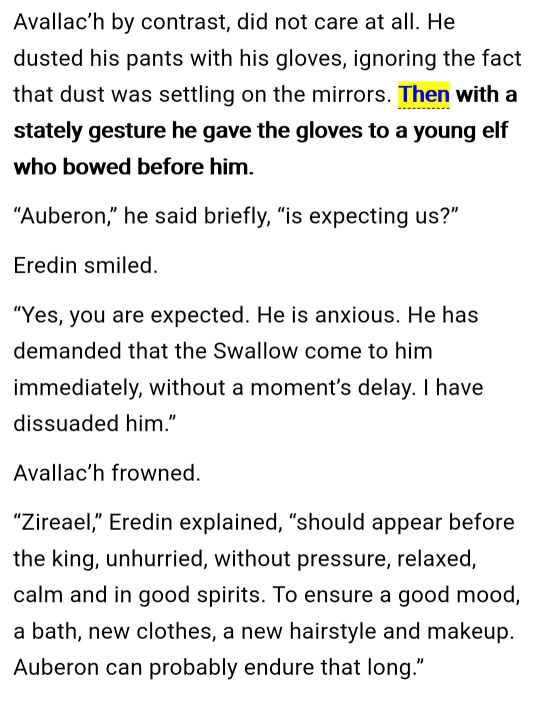
So, Auberon couldn’t wait either. Not because he had any unsavory intentions toward Ciri, of course, but... well, probably out of a mix of family feelings and sheer curiosity.
As for Avallac’h, he didn’t seem to care one bit that Ciri showed up before Auberon looking tired and dirty. Why? Maybe he figured it wouldn’t make a difference. Or perhaps he just thought Ciri was attractive enough to pull it off regardless. Who knows? Ava’s mind was elsewhere. He couldn’t care less about Auberon’s impatience or Eredin’s schemes to claim the Spiral.
So, what was Ava thinking? Likely this: how to outwit Destiny and save his own precious reputation. That’s my theory, at least—I could be wrong. But knowing Ava, it fits.
And then, of course, we all remember what happened next.
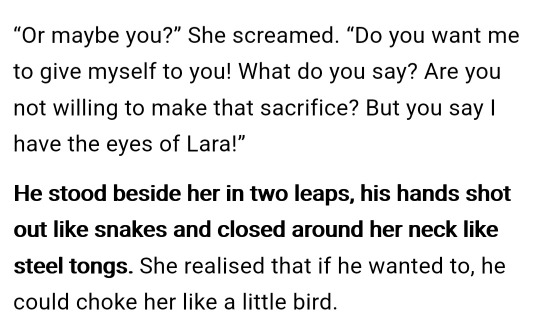
I mean, let’s be real—Ciri probably wouldn’t have thrown herself at a guy she found completely repulsive. What if he’d said yes? Then what? “Oh, sorry, Ava, that was just my emotionally frazzled state talking?” Awkward. But that’s beside the point. Ava, of course, got all grumpy about it, like, “What if I sleep with you and forget about Lara? Boo-hoo, sob-sob.”
But maybe it wasn’t just about Lara. He knew exactly who was meant for whom and who was supposed to do what with whom. And yet, he still lost his cool. She’d offered him exactly what he’d been running away from—just handed it to him, no strings, no overthinking. Bullseye. Right on the sore spot.
It wasn’t just about Lara. It was about someone chickening out. After all these years! Ignoring his own prophetic gift, no less. Knowing full well that his grand plan with Auberon was utter trash.

Crashed and burned, yep. Just like Geralt’s grand plan once upon a time—when he tried to weasel out of his destiny and hand Ciri off to someone else. Spoiler alert: it didn’t end well for him. Or for Ava, for that matter. Destiny, as it turns out, has a twisted sense of humor.
#witcher 3#aen elle#avallac'h#ciri#eredin breacc glas#cirillach#character analysis#elves in the witcher#meta witcher analysis
11 notes
·
View notes
Text
Weaving the web

Hanamiya Makoto x Fem!Reader
time skip: hanamiya and reader are in their late 20s; reader has a child
Warnings: smut, post-breakup, dacryphilia, heavy degradation, oral (f!recieving), threatening, edging, physical abuse (reader gets slapped in the face), toxic! hanamiya (lmao what were we expecting), emotional manipulation, reader is implied to have an abusive past, fluff if you squint
P.s. This is my first time writing smut, so the actual nsfw part might not be too satisfying, but I hope the storyline makes up for it, even tho it's kinda rushed
How long has it been? Hanamiya thinks back, reminiscing his relationship with you. It's been 3 years since he's seen you, and god this was not what he was expecting. You sitting by the seaside cradling a baby.
The breakup was messy, whenever you remember it a stench of nausea fills your guts. Makoto was never a nice man, you knew that from the start, everyone knew. From the first time you saw him in highschool you knew he was trouble, gliding down the halls with that unsettling smirk plastered on his face deciding who to taunter next. He waiting the day it was your turn, gosh he was like a flee, trying to mess up your relationships, tearing up your friendships. Yet nothing he ever did seemed to be enough to break you. You were intelligent, sure, he could give you that, but you were no where near his level; however that wit infuriated him to no end, dare he say you're wittier than him. Perhaps it was that that lured him in. He was so endowed into weaving his spider web that he had entangled himself in it. Hara would tease him about it during practise, how he always fixated on you, how out of everyone know one got on his nerves just as much as you did. Soon you both started talking more, less bickering, you were getting closer to eachother. Even if you weren't as intelligent as him, he found your shared conversations the most interesting. He was never bored around you. Sometimes he thinks that his intellect, as much as it is a gift, is his own damnation. School was too easy, apart from ruining basketball as a sport, tormenting people and playing darts nothing was fulfilling. Sure he's an avid reader, but he couldn't always read. With you he felt as if his brain found enough tranquility to switch off all the unending noise.
He remembers the moment you two had sex for the first time: you were both 3rd year students close to graduation, about to write a new chapter of life. You were together studying in the library, or at least supposed to study, when you decided to ditch the boring essay and go to his to play darts. You were surprised, not by the fact that he enjoyed throwing darts but by the fact he was willing to teach you. He was never patient with anyone. During that evening was a complete failure for you, guess the dart board wasn't on your side.
"Stupid, if you keep your arm in that stance you're never gonna hit the center, or the board for that matter."
"Yeah, well maybe if you actually decided to teach me and give me a few tips like you said earlier I wouldn't completely suck!"
"Ugh, you're such a pain you know? Whining all the time. Here, let me show you." Standing right behind you, a hand slip over your waist while his other grabbed your hand to change your position, he guided it to throw the dart.
"Huh, what a suprise, it landed on the board this time." Damn that sarcastic tone of his. If you could you'd throw him out of his own bedroom.
You stayed in that position for a few mere moments before he started kissing your neck, left hand making it un to your breast whilst the other slid down your torso.
You both will never forget that night, he was sure of it, nor will he ever forget the years you spent together in university. He was studying to become a lawyer, more specifically a criminal defence lawyer purely to piss people off. And to no one's suprise, he became a phenomenal one. Criminals from all of Japan, and some overseas, would come searching help from Hanamiya.
Maybe it was the work overload, maybe it was the fact that he refused to admit that it was too much, or perhaps fame. He became even more petty and angry towards everything. You understood it was bad when even his own mother told him to take some time off. But he wouldn't.
The night of the breakup was messy to say the least. "You're a masochist", "seems to me you enjoy the pain I give you."
Done you were, you told yourself, done. You swore to yourself that you'd never speak to him again. Not even holding a positive pregnancy test would make you crawl back to him for support. No, you'll get rid of this baby, you told yourself. But you didn't, you didn't find the courage to do so. You blamed it on the societal expectations of women, that every woman was destined to become a mother, the brainwashing of young girls letting go of their big dreams to settle down and bear children. Not that that automatically ment a big career was over, but it was hard. They made it hard. You didn't have family to turn to, Hanamiya knew that, he knew of your broken family and that's why he was so perplexed to see you by the seaside holding a damn baby in your arms.
Hanamiya chuckled as he watched the horror washed over your face. No, no, please, anyone but him.
"Hey love, longtime no see. Care to explain this nonsense?"
He didn't need an explanation, it was his, how could it not? He could tell by the baby's eyes, they were an exact resemblance of his.
"I don't need to explain anything to you, Hanamiya." You bark back. You said you were done with him, you swore it to yourself, yet here he is standing infront of you with that humouring glare.
Why the hell was he in Okinawa? Shouldn't he be in Tokyo working?
"Oh please Y/n, cut the formalities, it doesn't suit you. You know, I finally listened to ma, took that holiday, and look who we have here. I wondered where you had gone off to, couldn't reach you, didn't try really, but here you are."
God hates you, you're certain of it. God hates you more than he hates Hanamiya.
"This is a suprise, can't say a pleasant one tho."
He sat beside you, taking a closer look at the baby. It was a girl, a baby girl, he had a baby girl. Fuck, he almost couldn't bring himself to believe it. As much as he wanted to hate it he couldn't.
"If you're going to be a bother then leave. Ayame and I are trying to relax. Get your ass away from us."
Ayame huh.
As you were trying to woosh Makoto away Ayame opened her eyes, as her vision landed right onto Hanamiya she clapped her hands. Finally her Daddy's home.
Sometimes you hated Ayame's little brain, if there is one thing certain about her, it's that she inherited her father's high iq. She didn't need you to tell her who he was, one glance is all she needed, one glance, and she knew.
"Dada!" She started to wriggle uncontrollably tempting to get to Hanamiya. Dada Dada Dada, she repeatedly whispered. The one thing you feared happening is happening, and there was nothing you could do about it. Sure, you could run someplace Hanamiya wouldn't reach you, but his image would be engraved into Ayame forever. She would never forget him.
"C'mon, pass her to me." You're reluctant but you do as you're told.
Strange feelings pass over Hanamiya, he wasn't sure what to think of this other than the obvious: He's a father now.
As the sun set, you all went back to your place to have dinner. You agreed that he'd spend the night as he hadn't booked a hotel, or so he told you.
After dinner you put Ayame to sleep, now all that was left was to make a deal with the devil.
Hanamiya is sitting on your couch, watching you unamused as you sit next to him.
"You really expected that I'd have told you about her?"
No, he didn't.
"You're hilarious my dear, you would have saved yourself so much trouble if you just had the courage to pick up the phone."
He's infuriating, you just want to kick him out and leave him on the streets, oh how you'd love to, but you couldn't. You didn't want to.
"Fuck off Hanamiya."
"What did we say about formalities Y/n?"
"Alright, Makoto. You stay the night, but when I wake up I better not see you, otherwise I'll get a fucking restraining order."
"Baby please, I'm a lawyer. You couldn't win a case against me even if you tried. But what would Ayame think? Are you always this inconsiderate about her? As she grows older, what would she think of her lovely Mommy not letting her see her own sweet daddy, hmm? Think carefully Y/n."
"You bastard! How dare you-!"
Before you knew it he pinned you down on the couch under him, his knee between your thighs, rubbing at your core. Fuck, this wasn't supposed to turn you on the way it did, well... fuck him for knowing you too well.
"Not gonna lie, I did miss this."
"Fuck you. Get off me you bastard!"
"Quit the tongue Y/n, it doesn't suit you."
And with that his lips crashed against yours in a heated kiss, all the passion that was sealed throughout the 3 years of not being together bubbled up to the surface. You hated yourself for this. You never wanted to see him again but here you are under him, putty in his hands like you always were. Nothing has changed.
"Quit the lies too, if you didn't want me here tonight, you wouldn't have offered me to stay here, we both know I earn enough money for a decent hotel. You want this, tell yourself all of the above, but you can't deny it, you can't deny me anymore sweetheart, you're not getting rid of me any time soon."
You start to panic, it was true, once he entered your apartment you knew what was going to happen. Pathetically lying to yourself isn't going to make it better.
Slyly he unclips your bra and slides his hands under your shirt, clasping your left breast. He curses to himself, he missed this a bit too much. He tries to convince himself, and you for the sake of his arrogance, that he just missed the sex, but you knew otherwise.
He proceeds to pull your shirt over your head and take off your jeans, leaving you bare only for his eyes to see. Trying to hide yourself by grabbing the closest blanket, you feel a sting on your left cheek. "Nah-ah, you're not getting all shy on me now stupid girl" his whisper sends a chill down your spine,"where'd all that fight go, hmm?" Ending with a lick on your ear he turns to your neck. You knew by the end of this you'll be all bruised up, covered in hickeys. Worry hits you, what if Ayame sees the marks? But it doesn't matter, you like it this way anyway, you like it when it hurts.
"Ah!" He bites down nearly drawing blood. Makoto has always been sadistic, he once told you he started rough play when he was 12, always laughing at the pain of others, you're no exempt. On the contrary, you're his prime victim, your pain tastes like honey to him, sweeter than any he's tasted. As he sucks on your neck his left hand finds its way to your panties, white ones huh, when did you become so pure?
He starts circling your clothed clit slowly it almost hurts. His lips leave your now ruined neck and make their way back to your mouth. You groan into the kiss as he smirks.
"More more Makoto, 'want more!" He lets out a scornful laugh whilst kissing your abdomen. You sound like a bratty child throwing a tantrum, and you know what happens to brats? They need to be disciplined.
"So impatient and we're just getting started, ah~ , how did I find myself such a slutty brat?" You want to protest, but soon you feel a hot breathe graze your damped panties. Hanamiya moves your them aside and gives your clit a quick lick and a delicate suck that makes your legs wriggle in delite. Oh how sweet you can be, forgetting the sour nature of Hanamiya Makoto. Nearly instantly you can feel your panties covering you clit.
"Fuck-ah!-" A slap lands on your pussy, "watch your mouth" he warns you. Ah! Another slap and Makoto wastes no time to dive in and smell the wet heat of your core. He begins to lick your clothed pussy. It's not enough, it's definitely not enough, but when is it ever enough for you. Finally after a few whiny moans he slips you panties off, feeling a tongue beginning to lap around your folds. There was no questioning Hanamiya's oral performance, his silver tongue is able to give you high after high when he's generous.
"Ahh~, Ma-uh~, M-makoto hmm!" You manage to blurt out, hearing the slurps turns you on more and more. You can sense a knot forming inside. Hanamiya grins, he knows your body dangerously well, he's well aware of your upcoming climax. He starts to tongue fuck you as his right hand reaches your chin and plunges two fingers into your mouth making you gag.
"Mm-mmh!" The gagged moans were his favourite, fuck they were so slutty to him. He pulls his fingers out of your mouth and puts his index inside you.
"Cummin' m'koto" you slur out. A few seconds pass, but when you finally are going to release all motions stop, he pulls out his finger and slaps your pussy again. You cry out, how could he deny you?
"I don't think you deserve it. You know you've been such a whiny bitch to me, you don't even deserved to be touched you stupid slut." Another sting, but this time on your right plush cheek. "I find out you had my child and you didn't fucking bother to tell me!" Another slap, this time right across your face.
" I'm sorry I'm sorry! I- I-" tears threaten to fall. You do feel guilty, you kept the father of your child out of her life. Maybe for a good reason? But you can't reason, not when Makoto rams 3 fingers into your aching cunt catching you of guard.
"And you were planning on never telling me, you know you'd be the reason she would have felt empty, pain, asking you where her daddy is? When he doesn't even know she fuckin' exists! You stupid whore, you're a terrible mother."
Hot tears stain your face, this is why you left him, but you can't seem to think straight at the moment, not when you're about to cum all over his fingers.
"C'mon mommy", he taunts, "cum on daddy's fingers." His voice, that's all you need to reach your climax.
Suddenly he flips you over, one foot on the floor for support and the other firm on the side of the couch to reach in deep enough.
"You really thought you could get away with this? You're fucking delusional. Sooner or later I was gonna find you, track you down. I have connections, the ones that wouldn't mind beating up a few dozen people to find a stupid fucking slut. And here you are, safe and sound in Okinawa, and look! I found you! Maybe destiny is real." He knows it's the insanity talking for him. Destiny, fate, none of that shit exists. He was going to find you eventually nonetheless, it was only a matter of time. He's a criminal defence lawyer for fucks sakes, he's made friends here and there who'd gladly repay him with a favor if he'd ask faster than a blink of an eye. Realistically, he doesn't think he would've done such a thing. Or maybe, who knows. But there is something everyone knows, you know it too well: Hanamiya's unpredictable.
#hanamiya makoto#makoto hanamiya#hamaniya smut#kirisaki daiichi#hanamiya makoto smut#hanamiya makoto x reader#knb x reader#knb#knb smut#kuroko no basuke#kuroko no basket#hanamiya
172 notes
·
View notes
Note
Since we're keeping with the theme here, how about one for Loki? A silly little guy that may have started an apocalypse and can transform into anything he wants, be it animals, genders, or animal genders? That's prime Pride Month material
Loki - Day 51 (Request)
Race: Tyrant
Alignment: Dark-Chaos
June 10th, 2024

Trickster gods are a rather common sight in most mythologies- people always love an underdog story, stories about characters who rise from the depths below and strike out their own niches through their wits and manipulation of coincidences- and this one is no exception. Commonly cited as the archetypal trickster deity, though highly debated as to his very existence, today's Demon of the Day is one of the most famous members of the Nordic pantheon, a god who needs little to no introduction- Loki. This deity appears back and forth in pop culture, no matter where you look- from Marvel movies to spotlights in podcasts, sitcoms, and video essays, it's not hard to see why he's such an infamous figure throughout. As the Æsir of chaos, a shapeshifter, and a perpetual underdog, he's a common sight in stories regarding Norse myth... but not the mythology itself.
As mentioned before in my Idun spotlight, Norse mythology is frustratingly archaic to research- there are precisely two sources to work off of, neither of which truly being primary, as almost every primary source has been lost through either the eternal game of telephone history is, actual fragmenting, or a simple inability to read runestones. As such, the only two sources most contemporary scholars have to work off of are the Prose Edda and the Poetic Edda, a pair of tomes who are strained, to say the least. Both collections of tales, rather infamously, have been bastardized due to the fact that their authors were both Christian, and cared little for historical accuracy- instead, they rewrote as they saw fit, giving way to frustrations such as the insertion of a 'one above all' god that was never mentioned in any actual stories and is almost purely believed by scholars to be a future retcon of capital-G God into the text. However, this issue only pervades the text in some aspects, and we can look at it as a relatively accurate collection. However, what this has to do with anything is that Loki is a... controversial topic in some areas in the scholarly world, which I'll get into later.
In the mythos surrounding Loki, he was the son of a jötunn by the name of Fárbauti and a hitherto unmentioned goddess by the name Laufey. Laufey's existence is also seen as somewhat controversial- while mentioned as a goddess, from what I can tell, she's only mentioned in reference to Loki, which could entirely mean she's only been added in the Edda's in order to explain away Loki's origins, or, in another possibility, she could exist purely on the fringes of the mythology. Either way, though, this is just the start of several reigning problems with the presence of Loki in Norse text, and one of the most glaring ones in my eyes.
An observation borrowed from Overly Sarcastic Productions' excellent video on Loki is that he is incredibly hard to research for a myriad of reasons- his name roughly translates to 'The Entangler' for a reason, as his mythology is a confusing web of contradictions and baffling ideas, even in the few sources we have to work off of. While I won't repeat her points wholesale, in short, Loki's existence is hard to even verify- it's entirely possible he was a later retcon to explain some unexplained aspects of the mythology, such as how Ragnarok would come to be. Speaking of... what the hell is the deal with Ragnarok and Loki? Aren't I good at segways?
Moving away from the debated existence of Loki, we should center on his role in the mythology from what we know from the Edda's, which is quite a bit. While Loki may be hard to research for a myriad of reasons (refer to the OSP video above), we have several confirmed sightings of this cryptic cryptid of Scandinavian stories, starting with his general role as a mixed practitioner of both being good and evil. While Loki is most well known for his role in perpetuating Ragnarok, the literal apocalypse in Norse mythology that it almost all circles around, he's not a wholly good or wholly bad figure- no, he's a wholly mischievous one. I'll save the Ragnarok talk for a future DDS, such as one on Fenrir, so we can focus on Loki in the day-to-day lives of the Æsir, which is that of being an absolute pest. As a shapeshifter, this genderfluid icon is prone to several bouts of mischief, including but not limited to:
Starting the entire bout with Útgarða-Loki,
Turning into a fly to bother the smithing dwarves,
Becoming a pregnant horse,
Eating a burning apple and becoming pregnant,
Causing the death of Balder, a major point in the start of Ragnarok,
and entering the god's banquet, crashing their party, and being an awful drunk.
Yes, the pregnancies are just... a thing. Don't ask. Overall, though, Loki served as a troublemaker in every sense of the word, stewing up chaos wherever he went. Which included the research of him. Again, as mentioned before, and to quote 20th century scholar Gabriel Turville-Petre, "More ink has been spilled on Loki than on any other figure in Norse myth. This, in itself, is enough to show how little scholars agree, and how far we are from understanding him." Even the exploits listed above are debated somewhat, and many of them don't appear in some canonicities, while others do. The hot debate regarding Loki has been smoldering for centuries, with some proposing him as the God of Fire, others proposing him to be a retcon of Lucifer himself, and still others believed him to be a trickster figure. However, the most interesting of the four popular theories to me has to be one about him possibly being a Hypostasis of Odin.
"Cool, what does that mean?" I hear you asking. Hypostasis is a hard to explain term, to say the least, but it effectively means something that exists to support something else. Think of the Holy Trinity of Christian myth- The Father, the Son, and the Holy Spirit all support each other in simultaneously being god and not each other at the same time. In effect, this means that Loki could, theoretically, be an aspect of Odin to support his own existence- without Loki, there would be no Odin, and vice versa. This theory, first proposed by Folke Ström, however, has been hotly debated- three others also have quite a lot of credence from around the same time. While I personally find the hypostasis theory the most fascinating, the other three have several credentials as well- Jan de Vries concluded that he may be an archetypical trickster god, while Anna Birgitta Rooth came up with the idea that he was originally a spider, a storyteller, and a weaver.
Hilariously, the fourth conclusion about Loki at the time, one written by Anne Holtsmark, says that no conclusion could be drawn about Loki, making a neat little bow over this entire debacle. Fittingly for a trickster god, research into Loki and his continued existence is incredibly difficult. It's almost ironic, in a way. A common consensus now is actually quite a bit more simple- the idea that Loki is one and the same with the creator of humanity in the text, Lóðurr. The main argument in support of this lies in the idea that, in the Edda's, a set of three Æsir appear often together- Odin, Hœnir, and Loki, who each appear together in Haustlöng, Reginsmál, and a ballad by the name of Loka Táttur. The idea this theory supports is that each of the three- Loki, Odin, and Hœnir- created different aspects of humanity. Loki made the tricky and cunning side, Odin the loyal and intelligent, and Hœnir the commanding and violent. Odin and Hœnir are well marked as being creators of humanity alongside Lóðurr, and it's entirely possible, given the similar pronunciation of Loki and Lóðurr, that it was another epithet for Loki.
Overall, though, Loki is confusing, and I don't even know where to begin on this past the damn Wikipedia article, so I'm cutting this short before I get a headache. Loki is well documented, sure, but those documents are so filled with blots of ink that it makes it hard to look into. So many leads about Loki simply head in circles upon circles, up to the point one may find their own head in their ass in their research- when even the scholars whose jobs are to investigate find this topic frustrating, you know it's bad.
Now, impromptu venting out of the way, how is he represented in SMT? Honestly, I'm not a big fan of his original design- it's cool, sure, but it feels too plain and like a Dragon Ball antagonist to really stick out in my mind. However, the other interpretations throughout the series stick the landing on this tricky trickster far better.


My personal favorite has to be the Soul Hackers design, but Persona 5's is far from bad either- Akechi's Loki looks demonic and cruel, while the Soul Hackers Loki looks far more tricky and conniving, painting well into his role as, well, a trickster! The long blonde hair and bat-like wings make him intimidating and mysterious looking all the same, plus I'm just a sucker for blue and yellow. Mostly appearing as a magic attacker, befitting of his role in the mythology as a tricky shapeshifter, he's a definite favorite of many in gameplay.
#smt#shin megami tensei#megaten#persona#daily#ask#loki#dont feel bad anon but this one was exhausting lmao-#i'm a tad bit burned out due to it sorry#so yeah thats why its a bit of a late upload
15 notes
·
View notes
Text
Not derailing this post which is having a very serious conversation about sex, sexnormativity, and such. There's a quote I want to talk about in that @curlicuecal in the conversation says and relate it to the culture surrounding the adoption of new media:
...if you spend some time talking to people with different experiences or learning about even one culture other than your own ... It just opens your eyes to perspectives and options you never even knew existed. And suddenly you have more colors to paint with.
I believe that the major success of homestuck and (unfortunately) harry potter as well as the major failure of Jame Cameron's Avatar, and minor failure of most YA dytopia novels wit harry potter houses correlate to this New Colors Principle: If you give people new colors to paint wit, they will paint with them.
let's skip over homestuck (we'll get back to it) and (unfortunately) talk about harry potter for a moment. The four houses are arguably the biggest part of potterhead culture, and that's more than just marketing. A lot of words have been written on how the houses function in canon, forming the basis for a bad positive feedback loop that ultimately radicalizes snape, voldemort, and other syltherins to bibotry; as well as other problems with their in canon implimentations. But, the thing that made harry potter so fucking popular, aside from the factors of success largely unrelated to the book itself, was that it gave people some fancy new astrology signs by way of the hogwarts houses. They were new colors to paint with, and its unfortunately what makes it so fucking difficult to kill too, because people don't want to lose access to those colors they found meaning in (I still internally identify wit a house, cringing as I do, because I painted myself with that color, and cutting that part of myself away, despite my acceptance of its necessity is a hard and painful process I'm probably never gonna completely manage.)
By contrast, the failure of James Cameron's Avatar to form a cultural splash is because He doesn't spend enough time really rexploring the blue people's culture in a way that's understandable to a human audience. A lot of the blue people's culture exists only as either a plot device or the mystical native trope, which kinda betrays his opinions on the real-life indiginous peoples his blue people are coded as. He had the opprotunity to create some truly fascinating colors, and had he done so by cooperating with the native people he believes are a "dead end society", and all he made was puce blue.
And now back to the other end of the spectrum, to quote myself, "Homestuck is a now concluded long running web comic series written by Andrew Hussie centering around the paradox inducing shenanagains of ten humans, twenty-four trolls, a number of cerebum, and several other species; as they all quest both for personal growth and to herald the birth of a new cosmic frog multiverse which the surviviors of the narative can settle into: It’s a glorious mess." That quote comes from an essay in which I use huusian troll romance to analysize the romantic-sexual attraction of a character from a completely unrelated media.
The popularity of homestuck stems, I argue here in part, from the absolutely unhinged pallette of new colors it created. You've got astrology^2 in the classpects; you've got the trolls with their lexusi, blood heirarchy, and romance quadrants; the leprechaun have their charms (which is itself taking the piss out of troll romance quadrants), the dichotomy of the prospit and derse dreaming, the cherbum, all the various ways to conceptualize the self brought about by shenanagains in paradox spacetime. Homestuck offers some 40+ new colors to fuck around painting wit, and cringe though the execution might have sometimes been, people did enfact fuck around and paint wit 'em.
People love having new colors to play with, and culture is driven by the desire to paint, but also to discover new colors to paint with. What an excellent metaphor, that I should note was made by a person who, at time of writing, has a homestuck icon.
201 notes
·
View notes
Text
Whether you're a student, a journalist, or a business professional, knowing how to do high-quality research and writing using trustworthy data and sources, without giving in to the temptation of AI or ChatGPT, is a skill worth developing.
As I detail in my book Writing That Gets Noticed, locating credible databases and sources and accurately vetting information can be the difference between turning a story around quickly or getting stuck with outdated information.
For example, several years ago the editor of Parents.com asked for a hot-take reaction to country singer Carrie Underwood saying that, because she was 35, she had missed her chance at having another baby. Since I had written about getting pregnant in my forties, I knew that as long as I updated my facts and figures, and included supportive and relevant peer-reviewed research, I could pull off this story. And I did.
The story ran later that day, and it led to other assignments. Here are some tips I’ve learned that you should consider mastering before you turn to automated tools like generative AI to handle your writing work for you.
Find Statistics From Primary Sources
Identify experts, peer-reviewed research study authors, and sources who can speak with authority—and ideally, offer easily understood sound bites or statistics on the topic of your work. Great sources include professors at major universities and media spokespeople at associations and organizations.
For example, writer and author William Dameron pinned his recent essay in HuffPost Personal around a statistic from the American Heart Association on how LGBTQ people experience higher rates of heart disease based on discrimination. Although he first found the link in a secondary source (an article in The New York Times), he made sure that he checked the primary source: the original study that the American Heart Association gleaned the statistic from. He verified the information, as should any writer, because anytime a statistic is cited in a secondary source, errors can be introduced.
Dive Into Databases
Jen Malia, author of The Infinity Rainbow Club series of children’s books (whom I recently interviewed on my podcast), recently wrote a piece about dinosaur-bone hunting for Business Insider, which she covers in her book Violet and the Jurassic Land Exhibit.
After a visit to the Carnegie Museum of Natural History in Pittsburgh, Pennsylvania, Malia, whose books are set in Philadelphia, found multiple resources online and on the museum site that gave her the history of the Bone Wars, information on the exhibits she saw, and the scientific names of the dinosaurs she was inspired by. She also used the Library of Congress’ website, which offers digital collections and links to the Library of Congress Newspaper Collection.
Malia is a fan of searching for additional resources and citable documents with Google Scholar. “If I find that a secondary source mentions a newspaper article, I’m going to go to the original newspaper article, instead of just stopping there and quoting,” she says.
Your local public library is a great source of free information, journals, and databases (even ones that generally require a subscription and include embargoed research). For example, your search should include everything from health databases (Sage Journals, Scopus, PubMed) to databases for academic sources and journalism (American Periodical Series Online, Statista, Academic Search Premier) and databases for news, trends, market research, and polls (the Harris Poll, Pew Research Center, Newsbank, ProPublica).
Even if you find a study or paper that you can’t access in one of those databases, consider reaching out to the study’s lead author or researcher. In many cases, they’re happy to discuss their work and may even share the study with you directly and offer to talk about their research.
Get a Good Filtering System
For journalist Paulette Perhach’s article on ADHD in The New York Times, she used Epic Research to see “dual team studies.” That's when two independent teams address the same topic or question, and ideally come to the same conclusions. She recommends locating research and experts via key associations for your topic. She also likes searching via Google Scholar but advises filtering it for studies and research in recent years to avoid using old data. She suggests keeping your links and research organized. “Always be ready to be peer-reviewed yourself,” Perhach says.
When you are looking for information for a story or project, you might be inclined to start with a regular Google search. But keep in mind that the internet is full of false information, and websites that look trustworthy can sometimes turn out to be businesses or companies with a vested interest in you taking their word as objective fact without additional scrutiny. Regardless of your writing project, unreliable or biased sources are a great way to torpedo your work—and any hope of future work.
For Accuracy, Go to the Government
Author Bobbi Rebell researched her book Launching Financial Grownups using the IRS’ website. “I might say that you can contribute a certain amount to a 401K, but it might be outdated because those numbers are always changing, and it’s important to be accurate,” she says. “AI and ChatGPT can be great for idea generation,” says Rebell, “but you have to be careful. If you are using an article someone was quoted in, you don’t know if they were misquoted or quoted out of context.”
If you use AI and ChatGPT for sourcing, you not only risk introducing errors, you risk introducing plagiarism—there is a reason OpenAI, the company behind ChatGPT, is being sued for downloading information from all those books.
Historically, the Loudest Isn’t the Best
Audrey Clare Farley, who writes historical nonfiction, has used a plethora of sites for historical research, including Women Also Know History, which allows searches by expertise or area of study, and JSTOR, a digital library database that offers a number of free downloads a month. She also uses Chronicling America, a project from the Library of Congress which gathers old newspapers to show how a historical event was reported, and Newspapers.com (which you can access via free trial but requires a subscription after seven days).
When it comes to finding experts, Farley cautions against choosing the loudest voices on social media platforms. “They might not necessarily be the most authoritative. I vet them by checking if they have a history of publication on the topic, and/or educational credentials.”
When vetting an expert, look for these red flags:
You can’t find their work published or cited anywhere.
They were published in an obscure journal.
Their research is funded by a company, not a university, or they are the spokesperson for the company they are doing research for. (This makes them a public relations vehicle and not an appropriate source for journalism.)
And finally, the best endings for virtually any writing, whether it’s an essay, a research paper, an academic report, or a piece of investigative journalism, circle back to the beginning of the piece, and show your reader the transformation or the journey the piece has presented in perspective.
As always, your goal should be strong writing supported by research that makes an impact without cutting corners. Only then can you explore tools that might make the job a little easier, for instance by generating subheads or discovering a concept you might be missing—because then you'll have the experience and skills to see whether it's harming or helping your work.
19 notes
·
View notes
Text
End to End
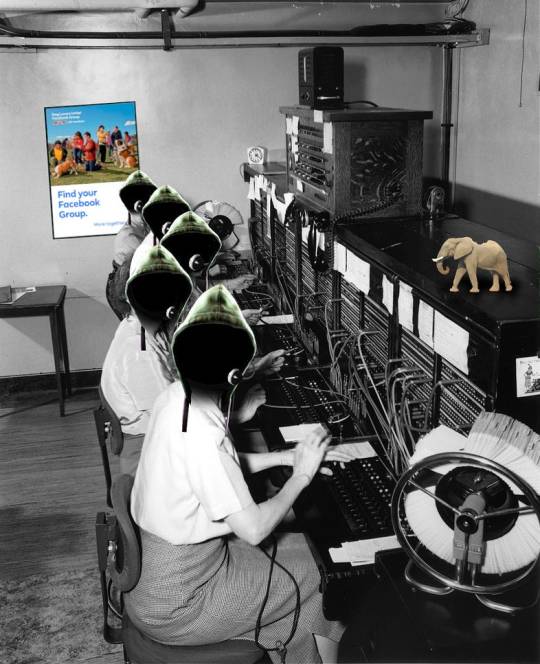
In “End to End,” my new column for Locus Magazine, I propose a policy framework for a better internet: the “End to End” principle (E2E), a bedrock of the original design for the internet, updated for the modern, monopolized web, as a way of disenshittifying it:
https://locusmag.com/2023/03/commentary-cory-doctorow-end-to-end/
If you’d like an essay-formatted version of this post to read or share, here’s a link to it on pluralistic.net, my surveillance-free, ad-free, tracker-free blog:
https://pluralistic.net/2023/03/07/disenshittification/#e2e
The original E2E marked the turning point from telco-based systems where power was gathered at the center, controlled by carriers, to the packet-switched internet, where power moved to the edges. Under the old model, only the network operator could add new features. If you wanted to create, say, Caller ID, you needed to convince the phone company to update its switches to support a new signaling system (and you probably had to rent a Caller ID box from the carrier, too).
But packet-switching made it possible for new services to be created by people at the edges of the network. Once your device was connected to the internet, it could exchange data with any other device on the internet. If someone set up a voice-calling system and you connected to it, they could add Caller ID to it without asking Ma Bell for permission.
End to end was the core ethic of this system: the idea that the telcos that sat beneath these systems should get out of the way of their users, serving only to deliver data from willing senders to willing receivers as quickly, efficiently and reliably as possible.
E2E was a powerful idea, one that truly treated the telcos as utilities — the plumbing that sat beneath the services, obliged to serve its subscribers by doing their bidding to the extent they could. If you chose to use a internet calling service instead of making phone calls, the carrier’s job was to shuttle those packets around, not to slow them down or block them to funnel you into its rival service.
There’s a powerful logic to this: no one rents a phone line because they want to make sure that the carrier’s shareholders are getting the highest possible return on their investment. The reason we buy network connections is to get to the services we value.
We have no duty to arrange our affairs to the benefit of a carrier’s shareholders. If those shareholders are so emotionally fragile that they can’t bear the thought of network users making their own choices on which services to use, they should get into a different line of work.
E2E wasn’t a law, it was a principle. Principles are useful! They can be embedded in laws (for example, the laws that establish most network providers as common carriers often include an E2E rule), but just as importantly, they can give us a vocabulary for critiquing or designing services: “Ugh, I won’t use that service, it’s not end to end,” or “How can we make this work in an end to end way?”
Principles can be integrated into professional codes of ethics, or procurement rules for public bodies (“Our university only buys end to end services”). Tech groups and publications can use principles to rank competing technologies (“Which network providers are end to end?”).
Network Neutrality is a way of operationalizing E2E: the idea of Net Neutrality is that carriers should be obliged to treat all traffic the same. If you request Youtube packets from Comcast, Comcast should deliver those packets as quickly and reliably as it can, even though its parent company, Universal, owns several competing services.
Net Neutrality can be treated as a principle (“This ISP sucks — it violates Net Neutrality”) or as a regulation (“The FCC is fining your ISP because it violated Net Neutrality”). As a regulation, Net Neutrality has a problem: it’s hard to administer, because it’s very difficult to detect Net Neutrality violations. The internet is a “best effort” network, with no service guarantees, so when your Youtube connection starts to jitter, it’s hard to prove that this is because Comcast is screwing with it, as opposed to regular network congestion.
Which brings me to my E2E proposal: end to end for services. Contemporary services have no E2E. If you search for a product on Amazon, Amazon often won’t show you that product until you’ve looked at five screens’ worth of other products that have paid Amazon to interrupt your search:
https://pluralistic.net/2022/11/28/enshittification/#relentless-payola
If you hoist an email out of Gmail’s spam folder and add the sender to your address book, Gmail will still send that message to spam, or even block its server. It’s incredible that we had a Congressional debate about whether Gmail should mark politicians unsolicited fundraising emails as spam but not whether emails from your reps that you asked to receive should be delivered:
https://doctorow.medium.com/dead-letters-73924aa19f9d
Platform creators are workers whose boss is an algorithm that docks every paycheck to punish them for breaking rules they aren’t allowed to know about, because if the boss told you the rules, you’d learn how to violate them without him being able to punish you for it. Again, it’s wild that we’re arguing about “shadowbanning” (a service choosing not to send your work to people who never asked to see it), while ignoring the fact that platforms won’t deliver your posts to people who explicitly subscribed to your feed:
https://pluralistic.net/2023/01/21/potemkin-ai/#hey-guys
Alexander Graham Bell’s first telephone operators were young boys who entertained themselves by deliberately misconnecting calls, putting you in contact with people you never asked to talk to and refusing to connect you with the people you were trying to converse with.
As @brucesterling wrote in The Hacker Crackdown:
The boys were openly rude to customers. They talked back to subscribers, saucing off, uttering facetious remarks, and generally giving lip. The rascals took Saint Patrick’s Day off without permission. And worst of all they played clever tricks with the switchboard plugs: disconnecting calls, crossing lines so that customers found themselves talking to strangers, and so forth.
https://www.mit.edu/hacker/hacker.html
Bell fired those kids. Even the original telecoms monopolist understood that the point of a telephone network was to connect willing speakers with willing listeners.
Today’s tech barons are much more interested in charging other people to interrupt your consensual communications with nonconsensual and often irrelevant nonsense and ads. This is part of the enshittification cycle: first, the platforms lock you in by giving you a good deal, including feeds that contain the things you ask to see and search boxes that return the thing you’re looking for.
Then, platforms take away your surplus and give it to business customers. They spy on you and use the data to help target you on behalf of advertisers, whom they charge low rates for ads that are reliably delivered. They insert performers’ and media companies’ posts into your feed, generating traffic funnels that result in clicks to off-platform sites. They offer low fees and even subsidies to platform sellers and creators who produce DRM media, like ebooks and audiobooks.
Users get locked into the platform — by the collective action problem of convincing their friends to leave, by the collapse of local retail that can’t match the investor-funded subsidies of would-be monopolists, by DRM that they are legally prohibited from removing, causing them to lose their investment if they quit the service.
Business customers also get locked to the platform: platform sellers have to sell where the buyers are; publishers and creators have to provide media where the audiences are; advertisers have to run ads on the services they’ve optimized for.
Once everyone is locked in, the platform can fully enshittify, harvesting surpluses from users and business customers for themselves. Platforms can hike fees, charge media companies and creators to reach their own subscribers, block posts with links off-site, insert ads into media (like Audible is doing with paid audiobooks!), and so on.
This is the cycle that E2E seeks to interrupt. E2E for services would dictate that platforms should connect willing speakers and willing listeners. The best match for your search should be at the top of the results — even if someone is willing to pay more to put a worse match there. Emails should be delivered to people you’ve told your provider you want to correspond with — not sent to a spam folder or blocked.
As with the original E2E, there’s lots of ways we can use this principle. It can simply be a term for criticizing platforms (“You aren’t sending my posts to the people who follow me — that’s a violation of the end to end principle!”). It can be a law (“It is a deceptive and unfair practice for ecommerce companies to deliberately return search results that are not the best match they can locate for the users’ query”). It can be a punishment (“The FTC settled with Google today and ordered the company to implement a Gmail feature that permits users to identify senders whose messages will never be blocked or sent to spam”).
Lots of people are pissed off about Big Tech and many have proposed that we could make it better by treating platforms as “utilities.” But I don’t want President DeSantis to run my email provider, or to decide what’s too “woke” for me to see (or post) on social media.
An E2E rule, on the other hand, creates a role for government that doesn’t determine who gets to speak or what they get to say — rather, it ensures that when people speak and to others who want to hear them, the message gets through.
Unlike Net Neutrality, E2E is easy to administer. If I claim that your emails are being sent to spam after I marked you as a sender I want to hear from, we don’t have to do a forensic investigation into Google’s mail servers to determine if I’m right. You just send me an email we observe where it lands.
Likewise for search: if I search Amazon for a specific product or model number, it’s easy to tell whether that product is at the top of the search results or not.
Same goes for delivery to subscribers: if we suspect that Twitter is shadowbanning posters — say, for including their Mastodon addresses in their bios, or linking to posts on Mastodon — we just send some test messages and see whether they are delivered.
Beyond administratability, E2E has another advantage: cheap compliance. Lots of the rules we’ve created or proposed for service providers are incredibly complex and expensive to comply with. Take rules about “lawful but awful” content, which require platforms to somehow determine whether a message constitutes harassment and block it if it does.
These rules require an army of expensive human moderators or a vast, expensive machine learning system, or both — so they guarantee that Big Tech will rule the internet forever, because no one else can afford to launch a new service with better community norms and better practices.
By contrast, E2E is cheap to comply with. Trusted-sender lists for email providers, search engines that put best results first, and content delivery algorithms that show you the things you asked to see in the order that they were posted are all solved problems:
https://www.theatlantic.com/ideas/archive/2023/03/social-media-algorithms-twitter-meta-rss-reader/673282

This isn’t to say that platforms wouldn’t be allowed to offer algorithmic feeds and results. Think of how Tumblr does it: you can choose between a feed called “Following” (posts from people you follow) or “For You” (posts that Tumblr thinks you’ll enjoy). Forcing platforms to clearly label their recommendations and give you the choice of controlling your own feed is a powerful check against enshittification.
If you know when you’re in charge and when the platform is driving things, and if you can toggle away from platform-determined feeds to ones that you design, the platform has to be better than you at choosing what you see, or you won’t choose its recommendations.
Platform owners have hijacked the idea that “freedom of speech isn’t freedom of reach” to justify the now-ubiquitous practice of overriding users’ decisions about what they want to see:
https://pluralistic.net/2022/12/10/e2e/#the-censors-pen
The Old Internet had lots to going for it. It wasn’t perfect, though. While it was easy to find the things you knew you liked, it could be hard to find things you didn’t know you liked. Recommendations, whether they come from an algorithm or a human editor, are a source of endless delights. But when a we find something we like through one of those recommendations, we need to know that we can find more from that source if we choose to.
Sometimes it’s nice to scroll an algorithmic feed and get a string of surprises. But we are forced to use those feeds, they will inevitably enshittify, to our detriment, and to the detriment of the people who make the things that please us.
As ever, the important thing about a technology isn’t what it does, it’s who it does it for and who it does it to. When we control our feeds, we can choose to let a recommender system do the driving. If we’re locked into a recommendation system, it drives us.
Today (Mar 7), I’m doing a remote talk for TU Wien.
On Mar 9, you can catch me in person in Austin at the UT School of Design and Creative Technologies, and remotely at U Manitoba’s Ethics of Emerging Tech Lecture.
On Mar 10, Rebecca Giblin and I kick off the SXSW reading series.
Image: Felix Andrews (modified) https://commons.wikimedia.org/wiki/File:Elephant_side-view_Kruger.jpg
CC BY-SA 3.0 https://creativecommons.org/licenses/by-sa/3.0/deed.en
[Image ID: A room full of telephone operators at a switchboard; their heads have been replaced with hacker-in-a-hoodie heads. On the wall behind them is a poster ad for Facebook with the slogan, 'Find Your Facebook Group.' Atop the switchboard stands a small elephant with a bite taken out of its back.]
#pluralistic#enshittification#disenshittification#e2e#end to end#feeds#algorithmic feeds#search#reverse chrono#rss#amazon#net neutrality
104 notes
·
View notes
Text
The Future of Television: an Introspection
I think we are at a transition point

This story begins in the Los Angeles airport, LAX. Earlier that day, I had a flight scheduled to fly from Burbank to Cincinnati (with a layover in Atlanta) to visit my parents. The flight, unfortunately, was delayed due to weather conditions, so the airline booked me for a or straight flight to CVG. After making my way over to LAX, I noticed the TV near a bar near where I was sitting- and something caught my eye.
An advertisement: for Disney+, Hulu, and Max for $17 with ads, and $30 with ads.
First of all, that's too inexpensive. With previous cable packages exceeding $100 a month, having 3 of the largest and most well known streaming services together in a single deal for less than a third of that previous price is simply unsustainable. My guess – is this deal is introductory pricing to get people used to this bundle as a norm, after which the price can slowly increase without much customer loss.
Secondly, why? Disney and Hulu makes sense, Disney owns Hulu, but Max? Max is owned by WarnerBros. Discovery, one of the largest companies in the video streaming space, and Max itself is a direct competitor to Disney+. What would they have to benefit from cooperation?
Here’s what they have to benefit:
Firstly - some business terms
A knock on the door is heard. Claire opens the door. BYSTANDER enters looking confused. Bystander: I thought this essay was about television? Claire: You thought making television was about making television? Bystander shrugs. Claire: Unfortunately... it's about the money >:3
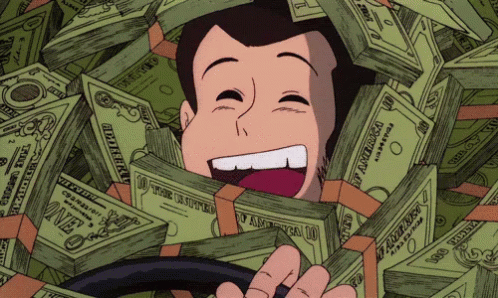
Economies of scale is an economic principle indicating that the more you produce of something, the less it costs per item to produce. If I want to make 1 copy of The Glass Scientists by Sage Cotugno (a very good graphic novel you should read ( ᵔ ⩊ ᵔ )), it might take me 5-10 hours to print out the pages, bind them together, cut out the cover, glue the whole thing, etc.
If the cost of the materials is, let’s say, $7.00, but it takes 7 hours to make (at $25 an hour, because I’m an expensive bitch (¬‿¬ )) - then it costs this hypothetical company $182 to make this one book. That means you as a consumer would be charged around $200 - very expensive (>﹏<).
On the other hand, if I want to make 10,000 copies of this book, and I have $100,000 dollars lying around (as one does), I can buy an industrial book printing machine for $30,000, and even with 30 hours of labor, it still costs:
Labor - 30 hours of work * $25/hr = $750 Materials - $7 per book * 10,000 books = $70,000 Cost of Equipment - $30,000 Total Cost - $100,750 Cost per book - $100,750 / 10,000 books = $10.075
about $10 per book, which, in terms of individual cost, is a huge difference from our first estimate of $182.
Now, to be frank, these numbers are all bogus. I have no idea how much it costs to make a book - but the principle is the same with real numbers.
When your production scales up, your cost per product goes down. Massive corporations don’t build megafactories because they like the aesthetic: they do it because it saves them money.

Now, this makes sense for physical products like books, but it also applies to intangible goods, like software, or web design, or streaming technology infrastructure (ding ding ding).
From a business standpoint it doesn’t make sense for 6 different companies to develop 6 different compression algorithms, and have 6 different interfaces to connect to 6 different data centers to do exactly the same thing: take an uncompressed ISO file, compress it for streaming, and send it to your device.
I personally think this is why we are seeing a lot of corporate consolidation in our current era of streaming – because, from a distributor perspective, it makes sense for all companies in the space to work together - or at least consolidate into a much smaller number of players.
But that’s only one-half of the story:
Seeing these companies merge and bundle was not what originally got me thinking about this whole, media market structure thing.
What got my gears turning was something a lot closer to what I actually care about.
Over the past couple of years, it’s been very disheartening to see many wonderful and amazing series get cut short for seemingly no reason.
I love Inside Job. Shion Takeuchi’s sense of comedy, combined with the fondness and criticalness the show has for Reagan makes her growth feel so authentic! I love seeing what she's doing, when she is in over her head, figuring out what she wants out of life. It’s amazing and funny and incredible.
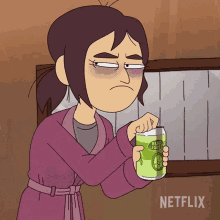
I love Scavenger’s Reign! Joseph Bennett and Charles Huettner and everyone on the crew do such an amazing job at crafting this eerie fascination for biology. I can totally see the show, and Joseph Bennett’s narrative style, becoming seminal in science fiction later on. Amazing work.
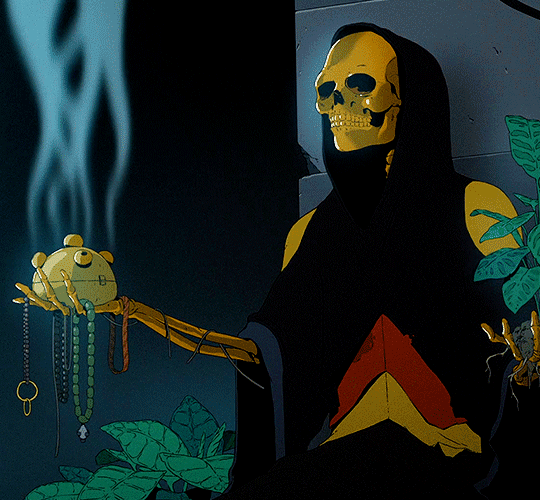
The Owl House! An amazing Disney show created by an amazing person loved dearly by many amazing people. (you can also replace the word amazing with the word gay and it still works! (o^ ^o))
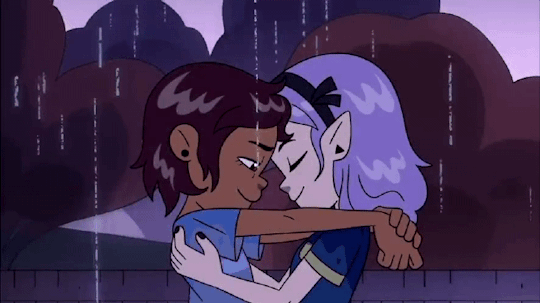
Inside Job wasn't renewed for a season 2 by Netflix. Owl House had its season 3 cut short. Scavenger’s Reign wasn’t renewed by Warner Bros. Discovery, was brought over to Netflix, and then was canceled by Netflix!
To be honest, I don’t know everything about television production. I want to learn and I want to discover but at this point in time I don’t have a clear answer of why these shows were canceled.
Dana Terrace has stated that The Owl House was canceled without her input, which is incredibly disheartening to hear.
Netflix hasn’t made an official statement about the reasons for Inside Job being canceled or Scavenger’s Reign - but I have a theory about what’s going on
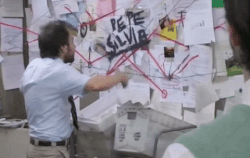
Remember when I mentioned economies of scale? Well, there’s an inverse economic principle called diseconomies of scale. Diseconomies of scale indicates that at a certain scale, as production gets larger, the cost per item gets more expensive, rather than less expensive. This can be due to a whole basket of factors, from increasing organizational costs, to transportation and distribution costs, etc. It’s the reason why there isn’t 1 factory that makes all the paper towels in the world. If economies of scale were an absolute rule, that single factory would be the standard, but it’s not. There are certain economic advantages to having multiple smaller factories rather than 1 giant factory (transportation, distribution, etc.).
There are economic reasons for a company to scale up production, but there are also economic reasons for a company to scale down or split production. When companies are at an equilibrium between economies of scale and diseconomies of scale, they are operating at their maximum market efficiency.
So, how does this apply to streaming companies?
Well, I mentioned before my theory that streaming companies are consolidating due to economies of scale from a distributor perspective, but these companies aren’t just acting as content distributors, they’re also acting as content producers.
Ye Old Media Wisdom Having a single company as a distributor and a producer is a bad idea. -me just now :)
Here’s why:
One of the aspects of diseconomies of scale is the problems with large organization. As a company gets larger, it becomes more and more difficult for people to communicate up and down the ladder and to communicate with different departments across the company. If your company is making something easily measured, like paper towels, your company can be both large and successful (like P&G) because the measurements of what makes a paper towel valuable for the consumer and for the company are easily communicated between teams. If a team is able to make a paper towel 10% more absorbent with a 2% increase in weight, it’s easy to communicate that possible change to a higher up - and their decision, whether to proceed with that change or not, will be made with most of the important details needed for that decision, primarily because those details are easy to communicate.
Making entertainment, especially animated entertainment, is something that is much more complex, subjective, and harder to communicate than paper towels. Different series appeal to different people, different shows have different voices, and being able to communicate the benefits of a series to a friend is challenging, let alone an executive 3 organization levels up. Additionally, making an impactful and amazing series takes risks! All great storytelling is communicating a perspective that is unique and engaging, but to make something unique is by definition to make something new, which requires risk. Larger companies are more risk averse than smaller companies: they have more to lose, are harder to change, and adapt less quickly. For a company whose primary purpose is to make stories that people engage with, being larger is, unfortunately, antithetical to that goal. People who want to make something different deal with more red tape, more bureaucracy, and more people their story has to please. It becomes harder and harder to make something that is new and impactful - to put it another way, it becomes harder to make something successful.
In my opinion, many of the recent releases of Disney feel… generic. Lightyear, Strange World, Wish - these films are by no means made by people without skill or character, but if those people are not allowed to take risks, if they’re not allowed to make anything outside the lowest common denominator of opinions, then the perspective these films convey is destined to be bland and uninteresting.
In my opinion, this is why companies like Riot / Fortiche and Sony Pictures Animation have been kicking ass recently. Spider-Verse, Mitchells and Arcane are amazing and seem to have the support and space they need. Since Riot and Sony Pictures Animation aren’t distributors, they don’t have the same pressure to become a larger company themselves. They can stay the size they want and continue to produce animation at a quality and risk level they are comfortable with.
I don’t know exactly what’s going on inside these companies, there might be other factors that contribute to their success - but I do know that making TV is hard. Making anything at a studio level is hard. Many people have to spend months of their lives working, communicating, and trying to discover what this thing they’re working on is. When people working on these series not only make something, but make something incredible - and after all that, are not be supported?
well, that’s just bad business

Epilogue
So where do we go from here?
Well if I were in charge of the largest media corporations on the planet, I’d say: spin off your animation production companies into their own entities and act, primarily, as the best distributor on the market. This will allow for you to remain as the larger corporate entity you want to be but remove the bureaucratic restrictions on production companies. Additionally, it gives the distributor more choices! Now they don’t only stream your own content, they can stream anyone else’s if they want! If another, better player comes into town, making more popular media, they can stream their shows instead. Production companies get the freedom to make great things, distributors get the structure and size that they need, and consumers, because of the competition between the two, get the best deal for their money.
This is what cable TV was in my opinion: one or 2 big distributors offering the same service, and many smaller production companies making the things we love.
Ideal market structure for media distributors, I think, is 1 or 2 big companies.
Ideal market structure for media producers, however, is many smaller companies.
It will take time, but I think we’ll get to this market structure eventually – or something new might come along, who can say (ᵔ ⩊ ᵔ)
In the meantime, I wish a tremendous amount of support to the artists and individuals who make the animation and series that we all love.
Y’all are why any of this exists in the first place – don’t forget that.
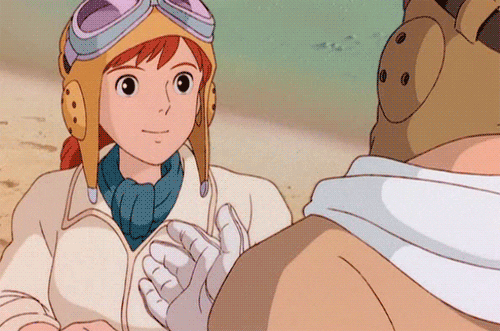
-Claire
3 notes
·
View notes
Text
There is one thing consistent in how I approach politics, philosophy, religion, and literary analysis: self-reliance. Self-reliance is (in this context) creating and maintaining a core set of beliefs and ideas separate from the world around you. These ideas are to be treated like muscles, exercised by observing the problems around you. Trusting another person with the synthesis of ideas, production of beliefs, and correct ways of viewing a topic weakens these beliefs, weakening your hold on your sense of self and making you susceptible to echo chambers, cults, knee-jerk reactions, and the hippie to Reagan voter pipeline. This idea was popularized by Ralph Waldo Emerson in his popular essay, Self-Reliance.
This idea of holding a core set of beliefs sheltered from the world at large is now more relevant than ever, in the era of web 2.0, where endless content creates endless chances to be lead astray. In order to safely use the internet, one must be able to a) understand the text and subtext of media, b) analyze this media in the context of ones own beliefs, and c) synthesize an opinion on the piece of media. These three steps simplify to 1) understand, 2) analyze, 3) Evaluate.
Try it right now with this post: 1) What surface-level point is this post trying to convey? What is the author's goal in writing this post? 2) Do you agree with what the author is saying? Why or why not? Do you partially agree or partially disagree, or is it black and white? 3) Are these ideas worth pursuing more? Are there any introduced ideas that have merit? If you disagree, create (in your head) a counter-argument centered around your own belief system that leaves you satisfied.
As you can see this can create a rather exhausting experience with media. As such, I use this technique selectively, when presented with discourse or when finding an overarching message in a piece of media. Enjoy your new sense of self and your improved media analysis skills!
2 notes
·
View notes
Text
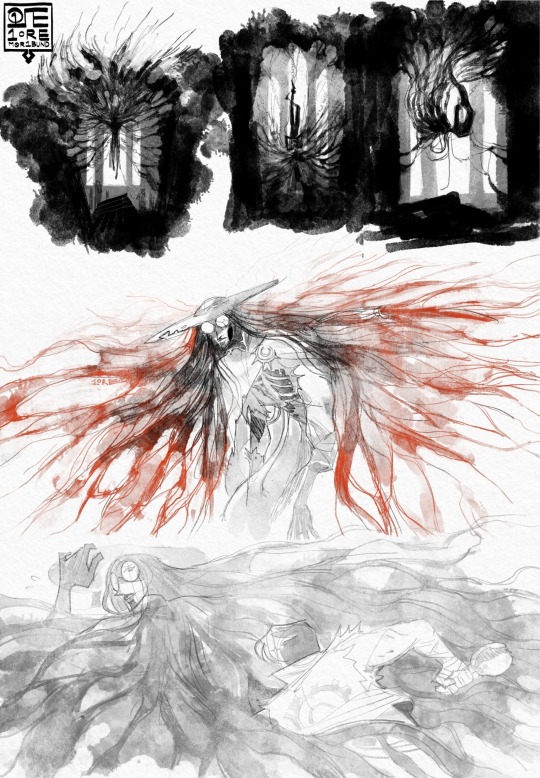
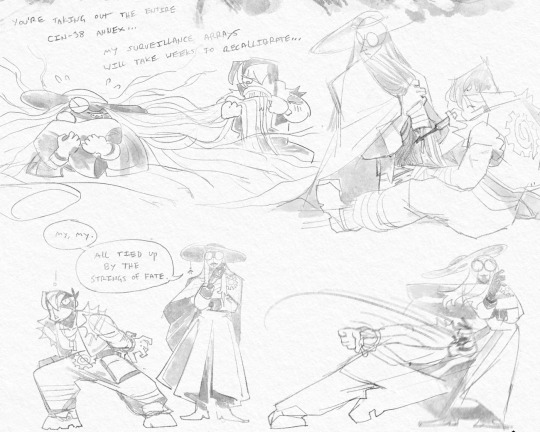

another mile-long sketchpost, huh, lore. image captions and essays about the walking existential nightmare are under the cut. Read on below or at m0r1bund.com ▶︎
[Images: Many many sketches of Frey and the Oracle of Caeres.
The first few doodles show a very different Oracle than we’re used to. Row 1 depicts the Oracle in digital ink washes. She’s a black silhouette, hanging from the ceiling by a great mass of wires and threads. They fan out from her head like hair, chaining her to her surroundings. She’s posed differently in each vignette: hanging upright, bound with her hands behind her back, and reversed, like the ‘hanged man’ tarot card.
The next drawings show an Oracle who has seen better days. He looks more like a shambling wraith than his typical well-groomed self, with singed robes, cracked glasses, and a grisly gash across the chest that exposes his ribcage. His face is gaunt, cheeks hollowed out like a mechanical mask. Most striking is his hair, which fans out in all directions like a maze of red arteries, reaching beyond the borders of the page.
The Oracle is a little more put-together in the next doodle, although her hair is still an unruly web of threads and wires. Frey charges bravely into the mess, brandishing a brush. Kairos looks uncharacteristically concerned about this as her hair envelopes her.
Following shortly is a drawing of Frey with a fistful of the Oracle’s hair, which she diligently brushes. The Oracle buries his face in a pillow, looking nervous. He says “You’re taking out the entire CIN-38 annex… My surveillance arrays will take weeks to recalibrate…”
A nearby sketch shows Frey with a flathead screwdriver, negotiating with some exposed machinery in the Oracle’s stomach. The Oracle glances away and fingercombs her hair tersely.
The last bit of tomfoolery shows a more typical Oracle of Caeres, who is cracking an amused smile at Frey. Frey seems to have weaseled her way out of prison, but not the binds on her wrists. The Oracle comments “My, my, all tied up by the strings of fate.” Without warning, Frey whips around and tries to headbutt the Oracle. He steps out of the way, unfazed.
Finally, there are some sharp, graphical drawings of Frey and the Oracle. They’re rendered in black and white, with splashes of red and yellow.
The first drawing shows Frey breaking free of a birdcage, while the scar over her eye is still fresh and bleeding. She’s composed so that she fits neatly into the negative space of the broken cage. Behind her, yellow canary wings are drawn on tangents with her outstretched arms, and two geometric feathers lie under the cage.
The second drawing shows the Oracle, hovering in the center of the page. She is a black silhouette with no expression behind her circular glasses lenses. Her hair fans out around her in blood red, neatly snaking around the contorted silhouettes of several Archivists. They’re in agony, limbs locked at unnatural angles as they cry out. Each one is speared through the chest by a single, red hair. ]
◆◆◆
Was playing around with the idea of the Oracle being a secutor in disguise, but then I went back and forth on it for a while, because it ruins the fun of her being unknowable. But also it's whatever, it literally does not matter and I’m having fun thinking about it. Maybe the Oracle of Caeres should submit to the Mortifying Ordeal of Being Known. Maybe that would fix her.
I’m not 100% sold on who he is or where he came from. I think it would be funny if he was some warlord’s court wizard advisor who failed upwards by making the most outlandish predictions that somehow came true, and now everyone expects him to know things, but his deep dark secret is that he has zero predicative power and is just making shit up as he goes. Orrrr maybe even he can’t explain why this gift came to him, or how he got here.
Either way, the Empire eventually became unhappy with the idea that their puppet might someday die, or retire, or try to run away. So they did back-alley surgery on him and entombed him in an estate-sized prison-computer for 4763654837573 years.
To improve her intuition, she was hooked up to the most sophisticated surveillance array known to man, i.e. the red strings of fate, i.e. bad cable management, i.e. her ‘hair.’ Each thread is an individual sampling instrument so sensitive she can feel a pin drop on the other side of the known universe. Thousands of them are trained in every direction, on just about everything worth knowing. With these, she collects the massive amounts of data needed to run her complicated models and make predictions.
The threads are also tools of manipulation. They can slip unnoticed through skin and bone, and join with nerve tissue to send false signals or intercept neural impulses. This augments her foresight with an uncanny sense for what’s going on inside the heads of those around her. That said, it’s tricky to take readings without alerting the victim that something is wrong. Incoming signals can rarely be parsed in detail, beyond flickering images or vague emotional impressions. This kind of surveillance is often unnecessary, anyway, when the Oracle’s methods of indirect sampling are more accurate and reliable.
It’s also much easier to “read” someone's biomechanical augmentations than their nervous system. Convenient that these modifications are so popular in the Archive, because the Oracle needs to watch his back around other Archivists the most. On the flip side, this means that unmodified individuals are like black boxes to him—not worth the trouble of such invasive sampling.
Outgoing signals are even less precise. The Oracle’s power of suggestion is real, but it’s not accomplished by pulling strings. It is very difficult to mask these signals as normal impulses, and on the whole it feels Very bad and Very wrong to be puppeted around by them. Really, the most he does with them is change his appearance (a honed skill; virtually nobody notices that anything is different) or make people go away (no need to practice, because the discomfort is the point.)
Incidentally, there’s nobody left who remembers what she did before she dabbled in soothsaying. What happened to them? Don’t worry about it.
…She’s kind of subsuming the ghost at this rate LOL
◆◆◆
Have also been rotating Frey in my brain. She’s a little weird because, like Reyes, she’s one of the few Imperials with no biomechanical augmentations. Initially I was like “well, that’s a fun coincidence.” But then I extrapolated, because of course I did.
Normally you accumulate modifications over time, in her line of work. The ceaseless, grinding machines inevitably claim bits and pieces of the engineers who work on them, what with the famously ethical labor practices of the Empire. Even without some kind of grisly workplace accident, it’s desirable to get rid of your squishy bits, because it makes you more useful.
For this reason, I think Frey started out as a proverbial canary in the coal mine. Without any biomechanics to protect her, she would have served as an early warning system for gas leaks, radiation, and other environmental hazards.
It’s morbid work, but there’s tradeoffs that make it appealing to some. For one, it was in everyone’s best interest that she didn’t die. She also received better healthcare than probably everyone on the factory floor, and the chop docs were even discouraged from doing any ‘experimental operations’ when nobody was looking. On the flip side, the foreman won’t wait for you just because you don’t have the PPE your peers do. Frey would have to do 10x the work, 10x faster, 10x riskier just to keep up.
How does she feel about all that?
… Eh.
#chief and the r.a. tag#the oracle of caeres tag#frey tag#content warning: injury#content warning: blood#content warning: mind control#content warning: manipulation#content warning: by god you are the surveillance state nightmare#content warning: empire-typical fuckery lbr
24 notes
·
View notes
Note
ooohh that ask game has some interesting questions hmm how abt 16, 18, and 23?
i am realizing just how much this ask game is making me bare my soul goshhh (/not srs), thanks for sending me an ask, bibi!
16. What makes you immediately close a fic that otherwise seemed good?
hm...well, most of the time i try to stick it out even if i'm not enjoying the fic from the first few sentences. like, maybe it's just me but a lot of the first words of a fic tends to be the (for lack of a better word) "the gunk" that precedes the actual story? like some stories just have slow starts, but they do get gud.
but to answer the q, i guess stuff that makes me roll my eyes at a fic, in the context of x readers would probably have to be:
disclaimer: most of the time, i don't mind reading these. but there are just moments where they bother me as i'm reading
reader getting carried bridal style (i dont like it, i hate it. id rather be carried like a sack of potatoes. or id rather be carried like a goat by its shepherd. but i do like seeing characters getting princess-carried) just carry me like this instead 🤧🤧👇


royalty AU++CEO/office/corporate-setting AU (like secret princess of a kingdom or being a secretary, for example) i'm not a big fan of those kinds of settings. like ok sure a chara can look good in business formal or in some fine furs, but once the eye candy wears off thats when i exit the fic oops.
fics centered around marriage: i don't really enjoy reading proposals. also thinking of how the rings, the dresses, and the flowers look is hard bcs of my (partial?) aphantasia, but weddings Are Pretty Fun as a background setting. overall, i think what bothers me most is that the chara loses a bit of their personality after they get wed together with the reader.
^^actually in relation to this... im not that big of a fan of prom/dance settings, they both read very similarly, especially since the reader tends to be placed in the more passive role of being asked out. (but when you make it angsty or hurt/comfort, ok i will read it i'm a simple girl)
Oh and ig this is just me wishing for more in the Imposter-SAGAU genre of fanfic (i mean i'm still looking around, i don't feel desperate enough to write smth of my own), but i kinda wish the charas weren't so doe-eyed and quick to apologize to the reader. like, i get the feeling of wanting to write The Good Bits Immediately (e.g. being fawned over, getting to lord that blunder over the characters) but the potential of slowburn trauma recovery and developing a relationship from straight-up antagonism is Right There.
18. What media do you want to get into because of artists/writers you like?
i think i'd want to try reading more poetry? like, if i rb a lot of web weaving, i gotta know sumn other than "deep" pop lyrics (u wont find me saying nice things about ms sw*ft). so far i'm thinking of starting with ocean vuong and richard siken (basic ik but i mean, their works are good)
dunmeshi! i've been putting it off for forever 🙈🙈 (<-girlie watched frieren and forgor abt dunmeshi bcs they got yorushika to do the 2nd OP) but senshi,,,, SENSHI THE MAN THAT U ARE,,,,
Oh! and i'm rlly curious about alien stage! my sibling's dipping into it and he told me it was basically america's got talent x the promised neverland. and he said the magic words "toxic yaoi" and "doomed yuri," i Gotta watch it atp. (also like, carole and tuesday rearranged my brain, im ready to put a sadder spin on it😤)
23. What would you make a 5 hour video essay on, if you had enough time and motivation?
as soon as i read this all my hyperfixations have: left the server HAHAHA
maybe in terms of recent ones, i could try analyzing madds buckley's my love is sick. i wrote about that album for a final paper in a basic music elective, but i was constrained to only 3 pages so i only talked about 2-3 songs. but i could pretend to be a music major and regale ppl with how the leitmotifs tie together and completely destroy me add a new layer of meaning to the songs on subsequent listens. Also like, these songs just Get It (not sure what "it" is exactly, but there's smth related to first love and love lost*)
(but atm im just yoinking songs from there to use for fic/chapter titles, i plan on using one for this ruggie timeloop angst fic im plotting out anyway)
(art appreciation ask questions, please bug me to rb some underrated art and fic)
#dellet-asks#a runner up wud have to be ghost quartet...oh that song cycle has my heart#so many good lines and moments#it haunts me#*like not to say that queerness is a monolith but#there are some quote-unquote universal experiences (to some extent)#and im just floored errytime when i see recent art that just Gets It
6 notes
·
View notes
Text
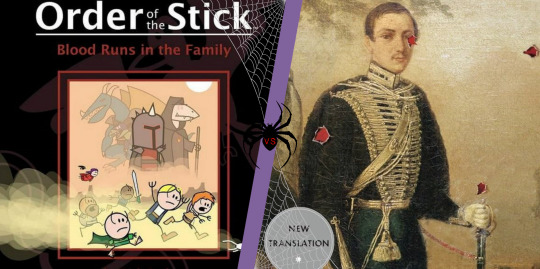
The Order of the Stick: Blood Runs in the Family (Rich Burlew) "The Order heads to the Western Continent in search of Girard's Gate, only to get entangled with the Empire of Blood, a tyrannical draconian state--literally, it's ruled by a dragon. But the real power behind the throne is General Tarquin, who turns out to be the bard Elan's dad. Tarquin, being a diabolical mastermind who’s just as genre savvy as Elan, has figured out that ruling openly will only lead to being overthrown, and thus has engineered a grand scheme with his partners to take over the entire continent using their puppet states. He doesn't even mind that Elan wants to overthrow him for being an enslaving dictator--if he wins, he rules as a king, and if he loses, he goes down in history as a LEGEND. Tarquin follows the Order as they try to reach the Gate, using it as a test for his other son Nale--a scheming villain like him, who has continually dissapointed Tarquin. When the Gate is blown up, he meets up with Elan and Nale, finds out that Nale killed his best friend, confirms that Nale wants nothing more from him…and stabs his son dead right in front of Elan because he's an inconvenience. Then he decides to kill Elan's good friend Roy so Elan can be the leader of the party. Tarquin is essentially a railroading DM in charge of a nation. He's an old white guy with self-centered, old-fashioned, and implicitly misogynistic and racist ideas of how the story is "supposed" to go--he's the Big Bad, Elan is the Hero, and they're destined to have a big epic showdown. But Tarquin isn't the main villain, Elan wants to be a support player, and Roy is the leader; so when Tarquin's plans are defied, he does everything in his power to steer things back on the rails by force, to the point of threatening to kill everyone Elan loves and chop off his hand just to properly motivate him."
'The Fatalist' in A Hero of Our Time (Mikhail Lermontov) "The last chapter of A Hero of Our Time is titled 'The Fatalist' - someone who holds the belief that all events are predetermined and therefore inevitable. The characters in it are debating whether or not fatalism is a valid worldview, and Lieutenant Vulic decides to test it. he states that everything is predetermined and our actions do not matter, loads the gun, points it at his forehead and pulls the trigger. nothing happens. Later that same night Vulic gets killed by a drunk Cossack. In high school we had to write multiple essays on this chapter and argue whether or not we think free will exists and is fatalism valid. It caused me a huge existential crisis. i recommend reading this chapter if you are in mood for a crisis, as it is short, free and available online here."
#web poll#the web#poll#the magnus archives#leitner tournament#The Order of the Stick#Blood Runs in the Family#Rich Burlew#A Hero of Our Time#the Fatalist#Mikhail Lermontov
3 notes
·
View notes
Text
Didn't get a chance to post either of these to the iNaturalist forum before they banned me for thinking transmisia is bad and shouldn't be tolerated.
Background is made up of the colors from my trans and nonbinary solidarity flag, though not the exact shades since I was using my phone and couldn't colorpick.


[ID: Two versions of a digital drawing of a werewolf drawn from the shoulders up, turning its face to the side to regard the camera with one narrowed orange eye, with yellow text below as dialogue reading, "Ok transmisic.".
The first version has the werewolf with very dark brown fur, the second has fur that is almost white.
The background is a purple night sky filled with yellow blue, and pink stars, with a black bush behind the werewolf covered in passionflowers. The petals are pink and blue, with yellow tendrils, and purple, black, and white centers. A full moon hangs in the upper right corner.
End ID.]
I'm tired of writing essays explaining why bigotry is bad. So I drew some reaction memes.
I actively and explicitly encourage encourage you to download these and edit them to add yourself, or your own character, as well as changing the background. You can also replace "transmisic" with another form of bigotry like "ok racist" "ok ableist" "ok misogynist" etcetera.
The only thing you can't do is use the suffix -phobia to call out bigotry, you have to use the suffix -misia. People with phobias do not deserve to be equated with bigots because they have anxiety disorders.
Here is a link to these files (along with other versions) on the web archive so you can download the HD versions for easier editing here:
"https://archive.org/details/Oktransmisicwerewolf"
Uh, I forget what else I wrote...
Oh wait. Here's a post with the context for me creating these.
You can buy them from my Threadless store because I've spent all week being misgendered and I deserve financial compensation. Brown fur - White fur.
Check out my all-inclusive werewolf flag.
Trans werewolves unite.
Happy Wrath month.
#Rjalker does art#werewolfkin#otherkin#werewolf#trans werewolf#trans#transgender#nonbinary#Xenogender#neopronouns#ititspronouns#Queer#LGBT#MOGAI#LGBTQIA+#Pride month#Wrath month#furry#since you can add your characters lol#fuck transmisics#fuck transmisia#wrath month#pride month#queer pride#queer wrath#trans wrath#nonbinary wrath#xenogender wrath#otherkin wrath#you get wrath and you get wrath everyone gets wrath!!
11 notes
·
View notes
Text
Wonderful Web Wednesday 2
Testing Converso - Crnković
Converso was a messaging app meant to change the way people talked over the internet. It was released on the 21st of January, 2023 and is now gone from the internet. The only things left are a blog post exposing the absolutely rampant security flaws in their "state-of-the-art" encryption, and a couple of sponsored articles.
The article by Crnković was the catalyst that spun into the downfall of Converso. The post reads like an adventure book, telling the story of a great adventurer hacking and slashing through a field of broken promises.
The article begins by Crnković explaining how they heard about the app Converso. They had heard an ad for Converso on a podcast that presented Converso as an app that knew nothing about you or what you were talking about. From the perspective of someone who focuses a little bit on privacy, those sound like absolutely amazing promises. But from the perspective of a developer, I am a little skeptical, and so was Crnković.
This led them to digging into what was actually happening behind the scenes at Converso.
What they found is absolutely astonishing. I won't spoil a single bit here so go read it over at https://crnkovic.dev/testing-converso/!
Some secondary research (Spoilers)
Before writing this post, I decided to do some research into what Converso used to look like.
Here are the archives of the Converso website once at release and the other before the close - Converso's website at release - Converso's website near their closing
File Over App - Steph Ango
This quick essay by Steph Ango is an amazing 1 minute read. The essay explains that as we travel through the digital world, we deposit our data across hundreds of proprietary formats and servers. What happens when these formats and servers disappear? Where does the data that we have created go?
It just disappears to be lost forever.
There is a beauty in the way Steph Ango expresses their drive to durable data. They relate the files and data we create to the history our ancestors have left behind. Stone tablets, hieroglyphics, and ancient books have stood the test of time, proving to be information that is truly durable.
Making information that is durable is at the center of what Steph thinks tool makers need to account for when creating software. The tools that they create will not exist forever, but the data that their tools create should exist forever.
This is why Steph urges tool makers to give users access to their data in durable, transportable, and archivable formats. This way, if a user wants to see what they were doing 5 years or 5 decades ago, they can.
#wonderfulwebwednesday#wonderfulweb#files#app#software engineering#softwaredeveloper#encryption#blog#short reads#obsidian md#obsidian.md
3 notes
·
View notes
Note
hey there! I got here via your dream post and stuck around to read your writing. The “realistic” sci fi worldbuilding is very cool - especially detailed explanations of how tech like FTL travel works! Have you considered running a homebrew campaign, or partnering with someone who writes character/plot driven fiction? I find that tends to generate a larger audience. Your character first-person writing has some interesting ideas! Quick tip - the overuse of commas chops up sentence flow and makes prose more difficult to read. Try editing to remove some!
Hey anon, I appreciate the ask and the compliments very much! Thanks for joining me here in my little corner of the web! I'm really glad you like my work; that makes me very happy to hear because I pour a lot of time and love into it!
...Buuut you've sort of hit a nerve here so I hope you're prepared for an essay response! I'm sorry in advance for how long this turned out to be and I hope this doesn't drive you off, eheh. Again, I do genuinely appreciate the feedback.
See, my default method of storytelling is speculative fiction: a concept or set of concepts is the center of the work, and almost all my characters are just cogs in the story machine. Sure, I have some characters I’m attached to, but the vast majority are just there because they have to be. They’re not the point of the story. Characters ARE important, but they rank lower to me than worldbuilding. When I generate story ideas, the characters are just temporary vehicles for the audience to connect with a concept I’m presenting.
And with that, we come to the problem that you've brought up which kicks me right in the ass every time: people always latch onto the characters, and don't give half as much of a damn about the setting. Yeah, I'm sensitive about that! Because I fall in love with technical details like planetary system structure and the mechanics of warp drives in much the same way as everyone else fixates on their "blorbos." That's why, when it comes to original work, you'll pretty much only find worldbuilding and writing posts on the blog –not to say I don't ever post anything about my OCs, but I can write whole essays about setting details and none of my OCs have that same depth.
And, anon? I'd like you to imagine how alienating that feels. I can't help but be upset when all of my friends are having fun making character playlists and talking about shipping while I'm sitting over in my corner with a twenty-page spreadsheet detailing the statistics of hundreds of stars and planets that nobody wants to read, because it's boring to everyone but me! I have tried to get involved, making characters for the hell of it to play in the same space as my friends. I wanna be excited about them, but they just don't hold my interest nearly as much. I can't change this, and it kinda fucking sucks sometimes!!!
Yes, sure, I could absolutely partner with someone who's better at characters and character-centric plot than I am! That's a good and practical suggestion! But you know what would happen? People would latch onto those characters and pay them much more attention than the setting they stem from, and I honestly don't think I could cope with that. I've tried this too, actually; I'm the one doing most of the heavy lifting when it comes to the Midnight Sea lore. I love getting into the gullyworks, tinkering around and fitting all the pieces together, making the world tick like a well-constructed mechanism. I know my friends like that about me too! That feels good! I just wish I got more credit/attention for that in itself, rather than for what it enables. I'm the minority when it comes to fictional focus, and I just have to live with that.
Also, yes, I'm aware I have a tendency to use lots of commas. I'm very sorry it hinders you, but it actually helps me when I read things back and when I'm organizing my thoughts. I'm sorry but that's a stylistic choice I don't think I can shake, but I'll try to be mindful of my comma usage going forward. ^~^;
Let me reiterate just one more time that I genuinely appreciate your ask, and I hope you stick around! I'm glad you're here! I'm sorry this got a little venty and I hope this doesn't come off as defensive or rude. It's just that this is something I feel strongly about and I wanted to take the opportunity to be honest about one of my biggest and most persistent struggles.
#spy answers asks#spy has thoughts#also @ my friends who are reading this: I love you very much and I am not upset with any of you at all#worldbuilding#meta
7 notes
·
View notes